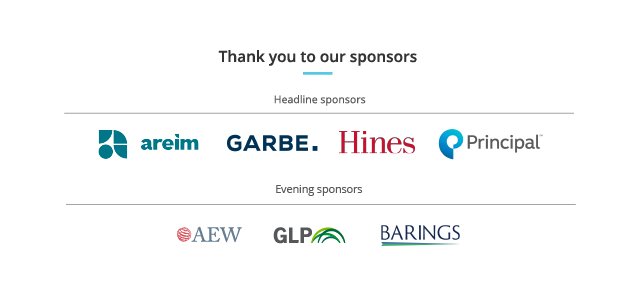INREV Young Professionals Conference 2022: Highlights
The Young Professionals Conference returned on 30 June, following a two-year hiatus – in the Swedish capital of Stockholm.
With a record number of delegates attending for the first time (86%). It was great to see so many fresh faces and spend the day learning while making new friends – many of whom will likely be in touch for many years to come.
Exploring the topic of how the new generation can ‘work together for a sustainable future’, the day was jam-packed with fascinating talks and presentations, all of which examined how our industry is key for sustainable growth. A huge thank you to the conference moderators, Leo Hertog, APG Asset Management and Simone Pozzatto, Hines, who did a great job.
After an insightful day, the Young Professionals took a well-deserved boat trip to the island of Fjaderholmarna, getting to catch up with peers and grow their network further.
It was certainly a conference to remember, and one that many are already looking forward to taking part in next year.
But what did we learn from our engaging speakers throughout the day? Here’s a quick summary of some of the key session, links to the presentations and a few photos.
Ron Keller, former Dutch Ambassador to Ukraine, Russia, Turkey, and China How war in Ukraine reshapes the European geopolitical landscape
Posing a question that is front and mind for many of us, Ron Keller asked: How will the war in Ukraine influence the process of globalisation?
Nearly two thirds (63%) of those attending believed that the Ukraine/Russia conflict will lead to global markets becoming more fragmented and the shortening of supply chains. While that prediction is likely true, Ron also argued that it would lead to several other negative consequences, including the re-emergence of geopolitical blocks and the end of globalisation as we know it today.
But what can we do to ease the tensions with Russia, and do we have any hope of bridging the political relationship?
Ron argued that to understand the present and assess the future, the first thing we need to do is look at history. Previously, we ‘made mistakes’ by simply punishing the losers of conflict. We do not know how the conflict will end but we can learn from history to not repeat the same mistakes.
Bridging these geopolitical relationships is important as without cooperation from every nation, we cannot tackle the global challenges facing our planet.
Collective action: managing the green transition Presentation by Shuen Chan, Head of ESG, Real Assets, Legal & General Investment Management
Climate change is a systemic risk to our global financial system. But what steps must our industry take to positively contribute to global climate repair?
Sheun Chan believes that we have a huge role to play. Building more resilient portfolios will not only help to achieve long-term value but will generate positive outcomes for the communities that live where those assets are based.
And there are several practical steps that we can take to help us on this journey, including developing climate models to influence investment decisions, determine risk and inform future adaption plans.
But beyond the practical steps, what advice would she give to young professionals looking to help build a more sustainable future?
- Always invest and manage assets with purpose - be aware of the impact that your work has on society
- Have integrity and be transparent in what you do
- Collaborate with your peers – only with a shared and aligned vision can we create a sustainable and inclusive built environment
Nordics in the spotlight: risk, return and sustainable leadership Presentation by Erika Olsén, CIO, AREIM
Do you trust your neighbour? 7 in10 of those who attended the Young Professionals Conference agreed to feeling such neighbourly love. A strong result, but according to Erika Olsén, there is one region that would boast higher levels of trust – the Nordics.
Over the last 20 years, GDP has outperformed the rest of the Eurozone and the region has become the third largest transactions market in Europe. But what is contributing to this success?
Erika believes that behind the prosperity lies one key factor, and the gold of the Nordics is, in fact, trust. The region is known for advocating high levels of social freedoms and self-expression. All of which is supported by an emphasis on trust and welfare.
These factors enable societies to flourish, prevent conflict, and increase openness to change and innovation. There is also a strong correlation between trust and personal priorities, including our commitment to the environment.
The road to diversity: turning policy into action Ernst Dekker, Founder, Dekker & Van Velzen
Do you always feel included and comfortable? Few at the Young Professionals Conference could say that they’ve never felt excluded, but what does inclusion really mean?
According to Ernst Dekker, inclusion is about being your true self and feeling welcome and included in all groups and settings. But more than this, inclusion is connected to our basic need for safety.
To achieve inclusion, it requires two basic needs being met – the need to be truly authentic and the need to belong. And just like in geopolitics, if you start from a position of exclusion, you receive exclusion back.
Community builder: creating better places through connections Keynote interview with Charlie MacGregor, CEO and Founder, The Student Hotel
What makes a great community? According to Charlie MacGregor, the secret mix is trust and diversity.
When you trust and allow demographics to mix, they behave differently. This trust empowers the community and creates better places.
When you trust people and ask people to get involved in the community, it gives them a sense of purpose – it keeps them engaged. And, when people help each other, you see humanity at its best.
Photo gallery
Thank you to our sponsors
